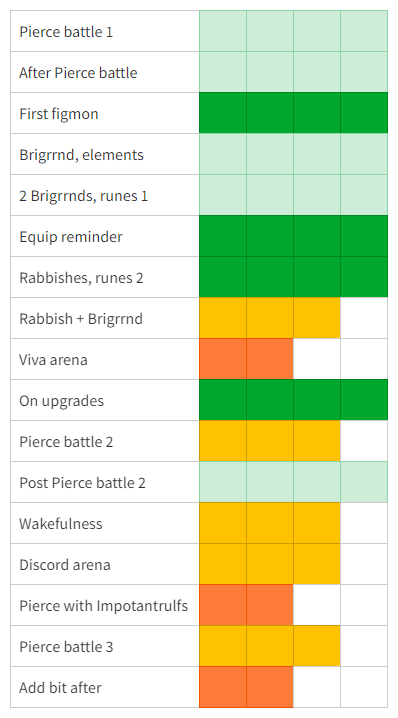DEVELOPMENT
1,126
Weekly Update - Tweaking Dialogue To 'Perfection'
3 years ago
I've just been tweaking dialogue scenes this week!
Also I'm posting this fairly late on Sunday because I almost forgot to write one of these this weekend!
I've done work consistently every day this week, but, as always, things take forever, I wish I could do more, make faster progress, etc etc. The usual.
I spent pretty much the whole week working on dialogue scenes. I have this list of scenes for the Sprouting Isle section (in chronological order):
![]()
It wasn't exactly made for eyes other than mine, hence the less-than-descriptive names!
They all exist, have content, and can be played through, but I've been going through them again and again because the exact lines don't feel
perfectly right for various reasons, so I just keep endlessly tweaking them. Adding or removing words, reordering things, checking back across other scenes to see if everything lines up and makes sense...
The colours here show the degree to which I feel they still need work, with dark green being 'as good as I feel it can be', and pale green being almost that (why past-me didn't have a five-point scale, present-me doesn't know!).
I wonder to what degree this is time well-spent, though. Maybe most people will just skim over the dialogue anyway so it doesn't really matter how 'perfect' it is? Maybe 'good enough' should be good enough? The less-than-masterful dialogue in MARDEK didn't seem to put anyone off?
With MARDEK, and most of my old work in general, I pretty much just used the first draft for everything, but these days I tweak details for days. It's the same with music composition, and 3D modelling... I do feel that the results are better than the rougher stuff I produced while young, though it's frustrating how much longer it takes.
I feel I've improved the flow and content of these scenes from what was in the second alpha, so it'll be interesting to hear tester feedback... though as I've yet to finish working on them, I've also not yet uploaded the new version despite hoping I would do by this weekend! Maybe next weekend??
If you make anything, how much do you tweak things before you're satisfied?
![]()
Also, I finished Final Fantasy VII! Which felt like a relief more than anything. I've been meaning to write a post about it, but... ehh. I've mostly just wasted this weekend frustratedly distracted by annoying Life Stuff.
I also hoped to write a personal post inspired by or kind-of following on from
∞ the one I wrote earlier in the week ∞, but I haven't done that either for the same reasons.






2